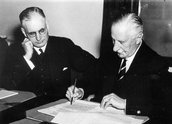
Curtin Speech: Japan Enters Second World War (1941)
Synopsis
Prime Minister John Curtin addresses the nation from Melbourne to inform them that Australia is now at war with Japan. This was the first occasion in Australian history that the nation had independently declared war on another nation.
Curator’s notes
Early on the morning of Monday 8 December 1941, in the Victoria Hotel in Melbourne, press secretary Don Rodgers woke Prime Minister Curtin with the news of the Japanese attack on Pearl Harbor. Ian Hamilton, an ABC journalist based in Canberra at the time, revealed in an oral history interview (NFSA title no: 225120) that he not only broke the news of the attack to Curtin via Rodgers but also reported on radio that Australia was now at war with Japan prior to any statement from the government. Hamilton sourced the news of the attack from a listening post that had been set up by the government to monitor the world via short-wave receivers at Mont Park near Melbourne.
On the evening of the 8th December Curtin broadcast to the nation that Australia was at war with Japan from Melbourne, though where in Melbourne is unclear. It was possibly either the Postmaster-General’s room at the Commonwealth Offices in Melbourne, where Prime Minister Robert Menzies had broadcast on 3 September 1939 via an ABC microphone the announcement of war with Germany, or the War Cabinet Room within the Victoria Barracks in Melbourne where the Declaration of War with Japan was signed on 9 December 1941. Still photography and film has survived which shows the presence of a microphone in this room.
Following the news of the attack, Curtin attended a War Cabinet meeting and also spoke at a public meeting to raise funds to replace the HMAS Sydney, which had been sunk on 19 November by the German cruiser the Kormoran.
It wasn’t until Monday, 8 December 1941, that Curtin broadcast to the nation that Australia was at war with Japan. It was broadcast from Melbourne, though where in Melbourne is unclear. It was possibly either the Postmaster-General’s room at the Commonwealth Offices in Melbourne, where Prime Minister Robert Menzies had broadcast on 3 September 1939 via an ABC microphone the announcement of war with Germany, or the War Cabinet Room within the Victoria Barracks in Melbourne where the Declaration of War with Japan was signed on 9 December 1941. Still photography and film has survived which shows the presence of a microphone in this room.
This broadcast has survived because it was recorded onto what was known as a transcription disc. These discs were made not specifically to preserve the recording for posterity during this period, but in order to distribute the recordings to a number of radio stations. Radio was an important medium during the Second World War for a public hungry for news of the conflict.
Other recordings of wartime broadcasts have survived in the National Film and Sound Archive, including speeches by Curtin and two other wartime prime ministers, Robert Menzies and Ben Chifley, as well as news reports and light entertainment such as variety shows and serials. The disc holding Curtin’s speech also holds another recording, dated several days later, of an episode of World of Sport. Sponsored by Dewar’s Scotch Whisky it consists of short reports on recent boxing and horseracing events.
It is unknown if the recording of the Curtin speech is an ABC broadcast or a commercial radio one or, in fact, both. It is believed that the Department of Information paid for the cost of landlines for a joint ABC–commercial half-hour broadcast on Sunday nights in the mid-1940s. In addition, there were various arrangements in place for commercial stations to use elements of ABC news. Other copies of Curtin’s speech have survived, but without the introductory music.
The recording begins with 'Advance Australia Fair’. This national song became the theme for the ABC news but not until February 1942. From 1942, the government directed the ABC to 'put Australia first’ in its news reporting, with daily bulletins of Australian news broadcasts to be introduced with 'Advance Australia Fair’. See also Majestic Fanfare (1943).
Though the Australian national anthem at the time was 'God Save the King’, it was not used in this broadcast, possibly to make the point that Australia itself was for the first time declaring war on another nation and that the region was directly threatened by an aggressor. This also sent a message to Britain that the priority of the Curtin government was to secure the defence of Australia. Curtin had previously warned that committing forces to Europe would expose Australia to danger.
Curtin was considered a great wartime leader, respected across the political spectrum. He stood up to the pressures from the Allies in order to protect Australian interests and used his oratory skills to unite the nation. He struggled to maintain his health under the stress and, unfortunately, did not live to see the end of the war. He died in office on 5 July 1945.
For more on Curtin, see Hellfire Jack: The John Curtin Story (1985) and the telemovie Curtin (2007).
- Overview
- Curator’s notes
- Audio full title
- Find a copy
- Comments 2
- Add your review



